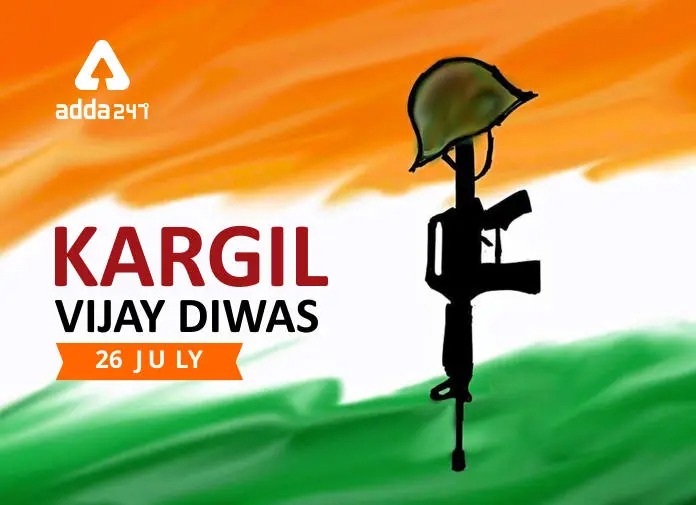Either I will come back after unfurling the tricolor, or I will come back wrapped in it."
Satyavan 'Saurabh'
Kargil Vijay Diwas is celebrated every year on 26 July to remember the sacrifices made by the soldiers in the Kargil War. An Indian Army mission 'Operation Vijay' achieved the ultimate success for India. Kargil Vijay Diwas is celebrated by every Indian on 26th July every year. This day is dedicated to the martyrs of the Kargil war 1999. Kargil Vijay Diwas marks the victory of the Indian Army in the Kargil War.
The Kargil War was started in 1999 by Pakistani soldiers who infiltrated the Kargil district. Kargil Vijay Diwas is considered a day to remember the martyrdom of hundreds of brave Indian soldiers. Kargil Vijay Diwas is the day on which the Indian Army won the war against Pakistan Army in 1999. On 26 July, the Indian Army recaptured all the Indian posts that were occupied by the Pakistan Army. Since then, the day is celebrated every year to remember the efforts and sacrifices of Indian soldiers in the Kargil War.
The Kargil War is one of the greatest wars fought by the Indian Army. The war took place between May and July 1999 in the Kargil district of Jammu and Kashmir. The Kargil War was the last of the four major wars fought by the Indian Army with Pakistan. The other three wars are the First Kashmir War in 1947, the Indo-Pakistani War of 1965, and the Indo-Pakistani War of 1971. The battle between the two nations in the Kargil War was very long, and it had a huge impact on both.
Like the words put out by Brock Chisholm, "No one wins a war. It's true, there are degrees of defeat, but no one wins." Like any other war, the outcome of the Kargil war was disastrous. Many parents lost their sons, many children lost their fathers, many wives lost their husbands, many lost their best friends, and India lost many brave soldiers. Let us salute our courageous soldiers who dedicated themselves to saving our lives from the enemies.
The Kargil War broke out between India and Pakistan in May 1999 and intense fighting between the nations continued for sixty days. On 26 July, the war was officially declared over, with the Indian Army declared victorious. It was first reported by local shepherds of Kargil district on 3 May 1999 of the presence of Pakistani infiltrators in areas near Ladakh in Jammu and Kashmir. The shepherd's message prompted Indian soldiers to form patrol units along the reported areas.
Later in May, Pakistan opened fire on India in the hope of retaliatory firing. The strategy was to actively engage Indian troops in the fighting so that Pakistani troops could easily attack Indian territories. As a result of heavy shelling, the Indian Army had no option but to fight it; Pakistani infiltrators took advantage of the situation and attacked Drass, Mushkoh, and Kaksar sectors.
Documents revealing the involvement of the Pakistani military were released by the Indian Army in early June. The Pakistani military claimed that the infiltration was carried out by "Kashmiri freedom fighters", who were later proven to be bald. The fighting during the beginning of the war was very hostile for the Indian Army as Pakistani soldiers and militants positioned themselves at key locations in that area.
Adverse environmental conditions such as mountainous terrain, cold weather, and extreme altitude provided a strategic advantage to the Pakistan Army. But still, our brave heroes managed to get many posts from the Pakistani soldiers. On 4 July, after an 11-hour long battle, the Indian Army captured Tiger Hill, and the next day, they recaptured Drass. The recapture of Tiger Hill and Dras made the war a great success.
Later, on 5 July, Pakistan announced the withdrawal of troops, and the force began its withdrawal on 11 July. The codename given to the Kargil War was Operation Vijay. On 14 July, the then Prime Minister of India A B Vajpayee announced the success of Indian troops in the war. All Pakistani infiltrators were driven out of our country, and the war officially ended on 26 July.
But this war reminds us of Captain Vikram Batra. Despite suffering serious injuries, he crawled towards the enemy and cleared the position with complete disregard for his safety, throwing grenades, advancing from the front, mobilizing his men, and pressing the attack almost impossible. achieved. But in the end, facing the heavy shelling of the enemy, this dear of Mother India died.
Inspired by his adventure, his army fell on the enemy with a vengeance, annihilated them, and captured Point 4875. Thus, Captain Vikram Batra displayed the most conspicuous personal bravery and leadership of the highest order in the face of the enemy and made the tradition of sacrifice supreme in the highest traditions of the Indian Army. ,
He told his family members - "Either I will come back after hoisting the tricolor, or I will come back wrapped in it, but I will come back". Captain Batra, a martyr of the Kargil war, was awarded the Param Vir Chakra on August 15, 1999. The award was received by President KR Narayanan during the Republic Day Parade on 26 January 2000 by his father. Captain Batra is recognized all over the country for his valor and bravery. The mountain has been named Batra Top given his role in capturing Point 4875.
Even though India emerged victorious in this war, we lost 527 courageous souls, and 1363 soldiers were injured in the war. Who can ignore those brave sacrifices? Let's remember their patience and be grateful to them.
